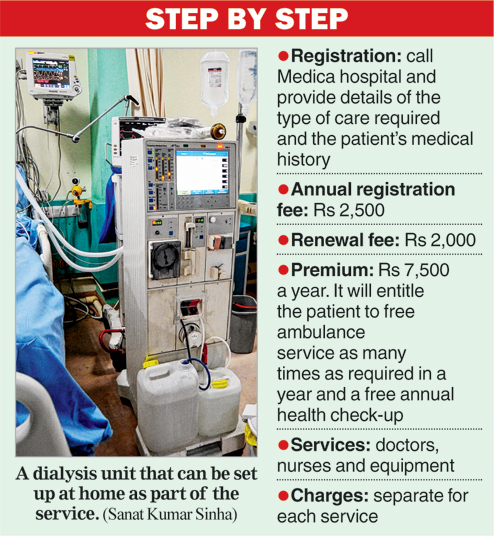
A private hospital in the city has launched a homecare service for those suffering from chronic or critical illnesses or those who have undergone surgeries.
Heart patients or those who have had cerebral strokes or cancer patients need long-term care and treatment, which is often difficult to carry on in hospitals because of cost and other problems.
"Hospital is for acute care and surgical fixations that can't be done at home," said Alok Roy, chairman, Medica Group of Hospitals, which launched the service on Thursday.
"But recovery and rehabilitation can be done at home with the help of latest technologies such as Skype, along with proper medical and paramedic support."
Speaking about the service, Roy said patients will have to first get themselves registered with the hospital. "Once registered, doctors, nurses, medical technicians, health assistants, care managers, nutrition experts and pharmacy specialists would visit the patient and provide treatment as required."
Apart from providing blood pressure checks, X-rays and ECGs, the hospital would provide advanced support like dialysis, he said.
"Reports of ECGs and other diagnostic tests can be monitored from the hospital. Terminally ill patients can be treated at home but people often lack the skill or time," Roy said. "We will provide 24X7 service, including doctor visits and other medical support."
Homecare is always planned care, the Medica Group chairman said.
"We will plan in advance what kind of care a patient requires at home... like physiotherapy or dialysis. But in case of exigencies, patients will be immediately brought to the hospital in an ambulance," he said.
After visiting a patient at his/her home, a doctor would seek the advice of specialists in the hospital, if needed, regarding treatment, a hospital official said.
The elderly whose children live outside the city often need medical help and nursing care at home but can't find professionals to provide it, a doctor said.
Bedridden patients need special beds to avoid bedsores. Also, people with chronic lung diseases need oxygen support at home, the doctor said. Cancer patients undergoing chemotherapy can develop complications like a drop in blood count. In such cases, regular medical surveillance at home can be of help, he said.
"About 50 per cent of the patients who have undergone surgeries or major treatment at a hospital need medical attention even after going home," said Kunal Sarkar, vice-president and head of cardiac surgery at Medica.
He said patients usually stay at a hospital for five days.
And they revisit the hospital 15 days after being discharged for a follow-up.
"During follow-ups, we often notice that something has gone wrong. But proper medical care at home could have prevented it," Sarkar said.
"Also, people have to spend a long time waiting at a doctor's clinic for consultation. This can be avoided through the homecare service."
Sarkar said the rate of hospitalisation in the US and in the UK has gone down by 75 per cent because of effective homecare services.
Special trains
Three pairs of weekly special trains will run on Sundays between Shalimar and Secunderabad from January 17 to 31. The train will leave Shalimar at 12.10pm and reach Secunderabad at 3pm on Monday.










